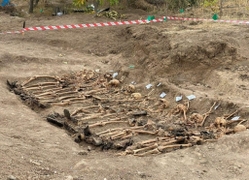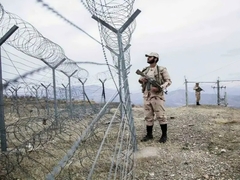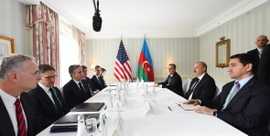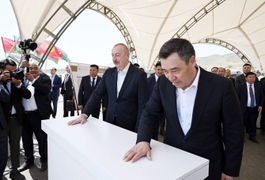Russia's President Vladimir Putin has reaffirmed Azerbaijan's sovereign rights over the Nagorno-Karabakh region, which recently saw heavy clashes between the forces of Armenia and Azerbaijan.
President Putin stressed importance of international law as the main tool to define the Nagorno-Karabakh region's territorial affiliation.
"Armenia did not recognize the independence and sovereignty of Nagorno-Karabakh. This meant that from the point of view of international law, both Nagorno-Karabakh and all adjacent districts were and are an integral part of the territory of the Republic of Azerbaijan," he said in a televised interview on Rossiya 1 channel, RIA Novosti reported on Sunday.
Putin went on to explain the non-intervention of Russia during the recent military operations despite its commitments to help Armenia as part of the cooperation in the Collective Security Treaty Organization (CSTO) military bloc. CSTO is a military bloc uniting Russia, Armenia, Belarus, Kazakhstan, Kyrgyzstan, and Tajikistan. The charter of the organization requires joint action of the member states for protecting state frontiers.
"The CSTO treaty provides for mutual assistance in the event of aggression against the territory of a country that is a party to this treaty. No one encroached on the territory of the Armenian Republic, and this did not give us any right to take a direct part in hostilities," Putin said, confirming that the fighting took place in the internationally recognized territories of Azerbaijan.
Amidst the recent clashes in the Karabakh region of Azerbaijan, former Foreign Minister of Armenia, Zohrab Mnatsakanyan said in October that Armenia could contact Russia and the CSTO with a request for military assistance. Armenia's Prime Minister Nikol Pashinyan addressed a letter to his Russian counterpart on November 3 to call for launching immediate consultations over Russian assistance to Armenia "taking into account the approach of hostilities to the Armenian border."
Russia, one of three co-chairing countries along with the US and France of the OSCE Minsk Group, the Nagorno-Karabakh conflict mediator, played a key role in ceasing the recent hostilities between Armenia and Azerbaijan in the latter's Karabakh region. Clashes sparked with the shelling of Azerbaijani military positions and civilian settlements by the Armenia's troops deployed in the occupied lands of Azerbaijan on September. Non-stop artillery attacks prompted immediate counter-offensive measures by the Azerbaijani forces.
The clashes escalated into a full-blown war with the intensive deployment of military equipment and troops by both sides. Azerbaijani army liberated around 300 settlements, including five cities from Armenia's occupation throughout 44 days of fighting until November 9, when hostilities came to a halt after Armenia and Azerbaijan reached a ceasefire agreement.
Moscow signed on November 9 a tripartite ceasefire statement with Baku and Yerevan to stop military operations, recognize territorial regains of Azerbaijan and oblige Armenia to return two occupied districts - Kalbajar, Lachin, and the occupied parts of Aghdam district to Azerbaijan by December 1. The ultimate role of Russia in the region under the agreement is to monitor ceasefire through a contingent of peacekeepers that have already been deployed and oversees the current situation, including the withdrawal of the Armenian military from occupied Azerbaijani territories.
Armenia returned the occupied parts of the Aghdam district to Azerbaijan on November 20 as stated in the trilateral ceasefire statement. The same scenario should be applied for the occupied Kalbajar region on November 25 and the district of Lachin on December 1.
In a video conference to discuss Russia's peacekeeping mission in the Nagorno-Karabakh region on November 20, President Putin said for Russia, the conflict in Nagorno-Karabakh and its settlement are of particular importance, given the fact that millions of Armenians and Azerbaijanis live in Russia. He added that for Moscow, this means an internal political dimension and is of very great interest from the point of view of ensuring internal security, as well as from the political aspect.
Moscow has dispatched two separate delegations led by Foreign Minister Sergey Lavrov and Defense Minister Sergey Shoigu to Yerevan and Baku last week. Discussions over the implementation of the tripartite agreement topped the agenda of meetings with both the Armenian and Azerbaijani leaderships, according to official sources.
Armenia and Azerbaijan have been locked into a decades-old conflict over the Nagorno-Karabakh region, which is an internationally recognized territory of Azerbaijan. Following the Soviet Union’s dissolution in 1991, Armenia launched a military campaign against Azerbaijan that lasted until a ceasefire deal was reached in 1994. Armenia occupied 20 percent of Azerbaijan’s internationally recognized territories including the Nagorno-Karabakh region and seven surrounding districts. Over 30,000 ethnic Azerbaijanis were killed and one million others were expelled during the military operation. Although the United Nations Security Council adopted four resolutions in 1993 demanding the immediate withdrawal of the occupying forces from the Azerbaijani lands and the return of internally displaced Azerbaijanis to their ancestral lands, Armenia failed to comply with all four legally binding documents.


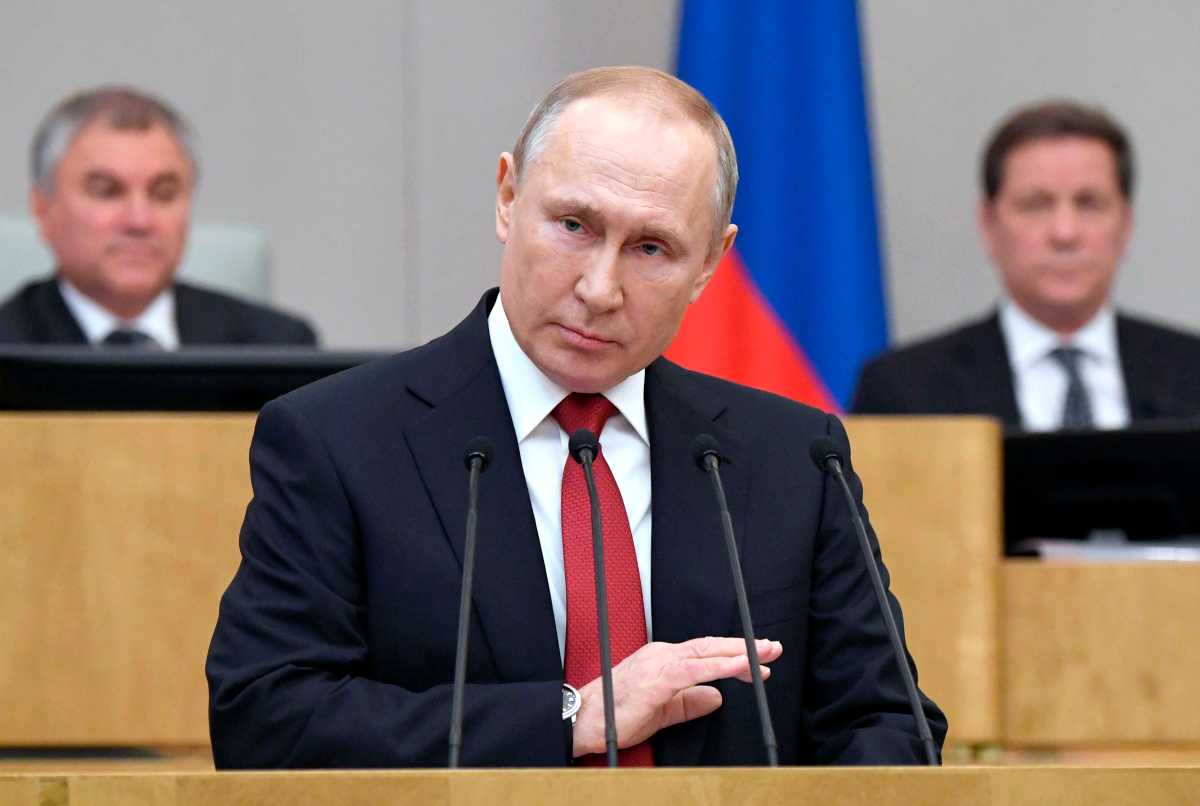




 Turkmen President Serdar Berdimuhamedow and British Secretary of State for Foreign Affairs, Commonwealth Affairs, and Development David Cameron dis...
Turkmen President Serdar Berdimuhamedow and British Secretary of State for Foreign Affairs, Commonwealth Affairs, and Development David Cameron dis...
 A draft resolution aimed at preventing the development and deployment of weapons of mass destruction (WMDs) in outer space, co-sponsored by Japan a...
A draft resolution aimed at preventing the development and deployment of weapons of mass destruction (WMDs) in outer space, co-sponsored by Japan a...
 Russia and Ukraine have engaged in direct negotiations facilitated by Qatar to address the exchange of children affected by the ongoing conflict.
Russia and Ukraine have engaged in direct negotiations facilitated by Qatar to address the exchange of children affected by the ongoing conflict.
